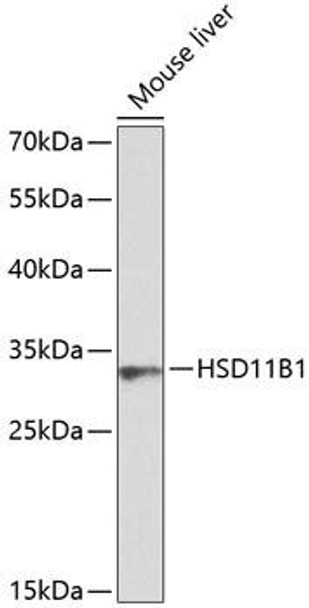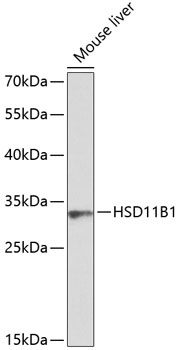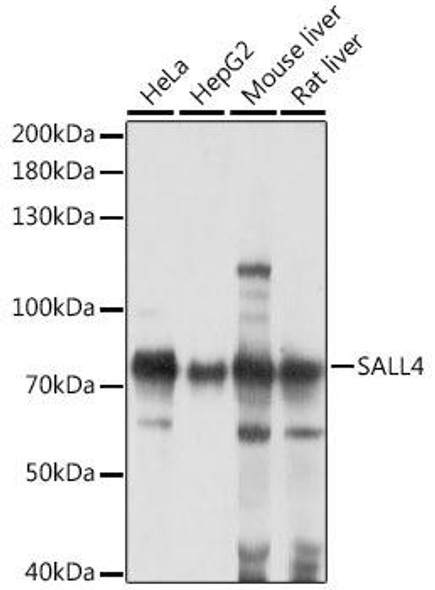Anti-HSD11B1 Antibody (CAB1619)
- SKU:
- CAB1619
- Product type:
- Antibody
- Reactivity:
- Mouse
- Host Species:
- Rabbit
- Isotype:
- IgG
- Antibody Type:
- Polyclonal Antibody
- Research Area:
- Metabolism
Frequently bought together:
Description
| Antibody Name: | Anti-HSD11B1 Antibody |
| Antibody SKU: | CAB1619 |
| Antibody Size: | 20uL, 50uL, 100uL |
| Application: | WB |
| Reactivity: | Mouse |
| Host Species: | Rabbit |
| Immunogen: | Recombinant fusion protein containing a sequence corresponding to amino acids 25-292 of human HSD11B1 (NP_005516.1). |
| Application: | WB |
| Recommended Dilution: | WB 1:500 - 1:2000 |
| Reactivity: | Mouse |
| Positive Samples: | Mouse liver |
| Immunogen: | Recombinant fusion protein containing a sequence corresponding to amino acids 25-292 of human HSD11B1 (NP_005516.1). |
| Purification Method: | Affinity purification |
| Storage Buffer: | Store at -20°C. Avoid freeze / thaw cycles. Buffer: PBS with 0.02% sodium azide, 50% glycerol, pH7.3. |
| Isotype: | IgG |
| Sequence: | EEFR PEML QGKK VIVT GASK GIGR EMAY HLAK MGAH VVVT ARSK ETLQ KVVS HCLE LGAA SAHY IAGT MEDM TFAE QFVA QAGK LMGG LDML ILNH ITNT SLNL FHDD IHHV RKSM EVNF LSYV VLTV AALP MLKQ SNGS IVVV SSLA GKVA YPMV AAYS ASKF ALDG FFSS IRKE YSVS RVNV SITL CVLG LIDT ETAM KAVS GIVH MQAA PKEE CALE IIKG GALR QEEV YYDS SLWT TLLI RNPC RKIL EFLY STSY NMDR FINK |
| Gene ID: | 3290 |
| Uniprot: | P28845 |
| Cellular Location: | Endoplasmic reticulum membrane, Single-pass type II membrane protein |
| Calculated MW: | 32kDa |
| Observed MW: | 32kDa |
| Synonyms: | HSD11B1, 11-DH, 11-beta-HSD1, CORTRD2, HDL, HSD11, HSD11B, HSD11L, SDR26C1 |
| Background: | The protein encoded by this gene is a microsomal enzyme that catalyzes the conversion of the stress hormone cortisol to the inactive metabolite cortisone. In addition, the encoded protein can catalyze the reverse reaction, the conversion of cortisone to cortisol. Too much cortisol can lead to central obesity, and a particular variation in this gene has been associated with obesity and insulin resistance in children. Mutations in this gene and H6PD (hexose-6-phosphate dehydrogenase (glucose 1-dehydrogenase)) are the cause of cortisone reductase deficiency. Alternate splicing results in multiple transcript variants encoding the same protein. |
| UniProt Protein Function: | HSD11B1: Catalyzes reversibly the conversion of cortisol to the inactive metabolite cortisone. Catalyzes reversibly the conversion of 7-ketocholesterol to 7-beta-hydroxycholesterol. In intact cells, the reaction runs only in one direction, from 7- ketocholesterol to 7-beta-hydroxycholesterol. Defects in HSD11B1 are a cause of cortisone reductase deficiency (CRD). In CRD, activation of cortisone to cortisol does not occur, resulting in adrenocorticotropin-mediated androgen excess and a phenotype resembling polycystic ovary syndrome (PCOS). Belongs to the short-chain dehydrogenases/reductases (SDR) family. |
| UniProt Protein Details: | Protein type:Lipid Metabolism - androgen and estrogen; Lipid Metabolism - C21-steroid hormone; Endoplasmic reticulum; EC 1.1.1.146; Membrane protein, integral; Oxidoreductase Chromosomal Location of Human Ortholog: 1q32-q41 Cellular Component: endoplasmic reticulum membrane; membrane; integral to membrane Molecular Function:11-beta-hydroxysteroid dehydrogenase activity Biological Process: steroid metabolic process; glucocorticoid biosynthetic process; lung development Disease: Cortisone Reductase Deficiency 2 |
| NCBI Summary: | The protein encoded by this gene is a microsomal enzyme that catalyzes the conversion of the stress hormone cortisol to the inactive metabolite cortisone. In addition, the encoded protein can catalyze the reverse reaction, the conversion of cortisone to cortisol. Too much cortisol can lead to central obesity, and a particular variation in this gene has been associated with obesity and insulin resistance in children. Mutations in this gene and H6PD (hexose-6-phosphate dehydrogenase (glucose 1-dehydrogenase)) are the cause of cortisone reductase deficiency. Alternate splicing results in multiple transcript variants encoding the same protein.[provided by RefSeq, May 2011] |
| UniProt Code: | P28845 |
| NCBI GenInfo Identifier: | 118569 |
| NCBI Gene ID: | 3290 |
| NCBI Accession: | P28845.3 |
| UniProt Secondary Accession: | P28845,B2R9Z1, D3DT89, |
| UniProt Related Accession: | P28845 |
| Molecular Weight: | |
| NCBI Full Name: | Corticosteroid 11-beta-dehydrogenase isozyme 1 |
| NCBI Synonym Full Names: | hydroxysteroid (11-beta) dehydrogenase 1 |
| NCBI Official Symbol: | HSD11B1 |
| NCBI Official Synonym Symbols: | HDL; 11-DH; HSD11; HSD11B; HSD11L; CORTRD2; SDR26C1; 11-beta-HSD1 |
| NCBI Protein Information: | corticosteroid 11-beta-dehydrogenase isozyme 1; short chain dehydrogenase/reductase family 26C, member 1 |
| UniProt Protein Name: | Corticosteroid 11-beta-dehydrogenase isozyme 1 |
| UniProt Synonym Protein Names: | 11-beta-hydroxysteroid dehydrogenase 1; 11-DH; 11-beta-HSD1 |
| Protein Family: | Corticosteroid 11-beta-dehydrogenase isozyme |
| UniProt Gene Name: | HSD11B1 |
| UniProt Entry Name: | DHI1_HUMAN |



